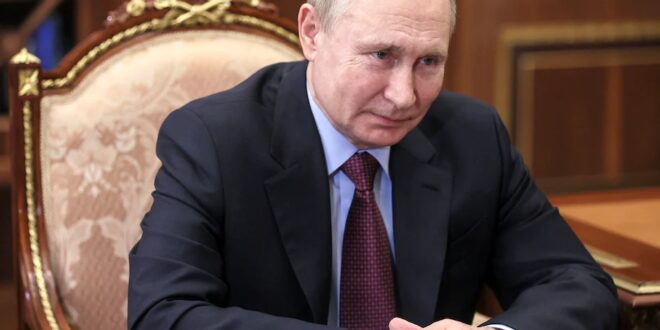If Russian troops massed around Ukraine do invade in the coming weeks, as many fear they will, Dec. 21, 2021, may go down as the day President Vladimir Putin fired the first rhetorical shot. Mr. Putin, seated before a group of high-ranking military officers on Tuesday, laid out an elaborate rationale for an invasion by portraying “retaliatory military-technical measures” as a last resort that Russia may be forced to take to defend itself from years of ever-greater provocation by an increasingly hostile NATO. “What’s happening now, the tension developing in Europe, is their fault,” he told the brass. “At every step Russia was forced to somehow respond. The situation kept worsening and worsening, deteriorating and deteriorating. And here we are today, in a situation when we’re forced to resolve it somehow.”
Mr. Putin may yet be bluffing, seeking to extract concessions from the government in Kyiv and from the Biden administration without actual bloodshed. His dramatic, urgent words — uttered publicly — leave little space for a face-saving climbdown. He sounds instead like a man in a hurry. Russian Defense Minister Sergei Shoygu, seemingly preparing Russian public opinion for war, spun a tale at the same Tuesday meeting about a supposed “provocation using unknown chemical components,” purportedly being prepared by American “mercenaries” in Ukraine.
Perhaps most indicative, Mr. Putin said there may be war unless the United States and its allies sign a binding commitment not to let Ukraine or other former Soviet republics join NATO — a demand for a recognized Russian sphere of influence he knows they cannot meet, and which therefore looks increasingly like a pretext for aggression. The United States has nevertheless offered to talk, but in the event negotiations fail, Mr. Putin can be counted on to cast the outcome as yet more justification for war.
To be clear, Mr. Putin has no legitimate casus belli regarding Ukraine. What he seems really to fear is not Ukraine-based NATO missiles, as he claims, but the growth and development of a successful, Western-oriented democracy in Kyiv, the exemplary existence of which would destabilize his own kleptocratic regime. His conduct, and the rationale for it, are false and unacceptable.
Yet he may not be wrong to believe he can get what he wants through war. Though far stronger than they were in 2014, when Mr. Putin seized Crimea and the Donbas region, Ukraine’s armed forces are probably no match for Russia’s and may well have to retreat quickly to the western side of the Dnieper River, which essentially bisects the country. The United States and its allies, distracted by domestic politics and coronavirus, can try to deter Russia by beefing up Ukraine’s capacity to fight back, and to punish Russia with economic sanctions. The potential efficacy of the latter is limited by Western Europe’s dependence on energy from Russia, however. Moscow can do retaliatory damage through cyberwarfare and other means.
The Soviet Union collapsed exactly 30 years ago this month, an event that opened up vast new possibilities for freedom and self-determination in Europe, but whose geopolitical consequences Mr. Putin has openly lamented. He seems bent on reversing them, quite possibly by force, and sooner rather than later.
 Eurasia Press & News
Eurasia Press & News



